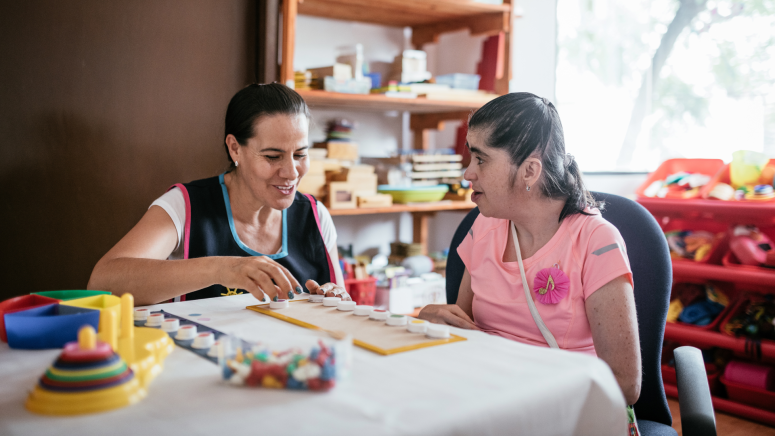
For a typical child, doctor’s visits are a small portion of their lives, mostly necessary for preventive visits and occasional illnesses. For children with medical complexity (CMC), however, in-patient and out-patient medical visits are routine parts of daily living for managing multiple serious and life-threatening chronic conditions. These children may require a feeding tube or a ventilator, numerous medications, and an around-the-clock caregiver, often a parent or family member, to attend to their needs.
If all this were not enough to manage, parents and caregivers also navigate fragmented health care systems as their child’s primary care coordinator between dozens of physicians, sub-specialists, and support services (e.g., home care, social services). CMC and their families and caregivers across the country require more integrated systems of care to achieve better outcomes and quality of life.
To address this critical need, AcademyHealth, in partnership with Boston Children’s Hospital, Family Voices, the University of California San Francisco, Patient Advocate Foundation, and the American Academy of Pediatrics, is leading the Enhancing Systems of Care for Children with Medical Complexity Coordinating Center (ESC CC) as part of the larger HRSA-funded Enhancing Systems of Care for Children with Medical Complexity project from 2022 to 2027. The ESC CC’s primary charge is to support five HSRA-funded Demonstration Sites in developing models of care that optimize the health and well-being for CMC and their families while also advancing health equity for these populations.
The five HRSA-funded Demonstrations Sites shared their progress-to-date towards this goal during the “Transforming Care for Children with Complex Medical Needs: Insights from HRSA-funded Demonstration Sites” webinar in late spring. Across all sites—ranging from complex care clinics to a social services organization to a dental clinic for CMC—several unifying themes emerged within their unique care models:
Emerging care models necessitate innovative approaches to enhance care coordination across various sectors (e.g., medical, behavioral health, and psychosocial care).
- The Dell Medical School at the University of Texas at Austin (Dell Med) and the Dell Children’s Comprehensive Care clinic (CCC) has piloted a new model of the typical wellness visit: the Whole Child Visit. The Whole Child visit is scheduled bi-annually for each child and integrates telehealth and a shared electronic record system to allow various specialists to meet with the child and their caregivers simultaneously. By streamlining care across specialties into one visit, treatment regimen conflicts are avoided, and appointment burdens are reduced for both families and providers.
- The University of Texas Health San Antonio School of Dentistry (UTHSA), whose dental clinic serves intellectual and developmentally disabled populations, has designed a specific curriculum for medical and dental professionals and trainees to better serve CMC. The curriculum features didactic and clinical components that will prepare providers to deliver optimal care to CMC and their families.
Empowering parents as equal partners in their child’s care and in the design, implementation, and evaluation of sites’ care coordination models deeply enhances care experiences.
- ChildKind is thinking outside of the box about family engagement by incorporating it into the very basis of their care coordination model. The site empowers low-income and under-resourced parents and caregivers with the skills and confidence necessary to manage their child’s care needs and coordinate their care. Additionally, the site is prioritizing the involvement of an often-under-represented population, fathers, in the design, implementation, and evaluation of their care coordination model.
- The University of Florida is harnessing a Family Advisory Board (FAB) to prepare parents as advocates for their children using the principles of child rights, with a primary focus on trauma-responsive care and narrative medicine. Caregivers are engaged from the time they meet their care coordination team in the NICU (Neonatal Intensive Care Units), through the critical months of transition and throughout early childhood, when care is transitioned to primary care physicians.
Health equity assessments can be deployed to help define and improve access to care for all medically complex children and their families, particularly those in underserved populations.
- All five Demonstration Sites are developing and administering health equity assessments (HEAs) to their unique populations. These health equity assessments seek not only to query areas of social need, but to also utilize the data collected to meaningfully improve care coordination that addresses these needs within sites’ capacities. For the University of Montana, prioritizing the needs of rural Montanans means that both “time” and “finances” and their intersection—the time required for travel and caretaking can preclude employment—are key health equity domains.
Across all five sites, researchers, health systems leaders, providers, care staff, and families are hard at work improving care coordination, empowering families, and advancing health equity for the CMC population they serve. By sharing insights that emerge from the implementation and evaluation of each of these care models in pursuit of these goals, positive change can be achieved and further disseminated on a national scale.